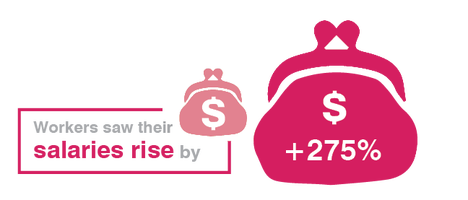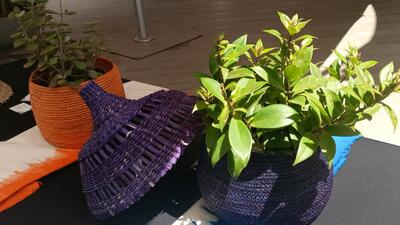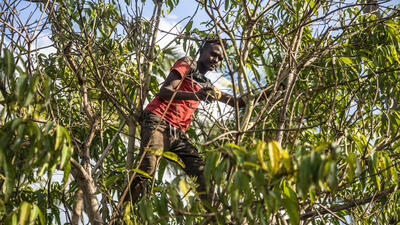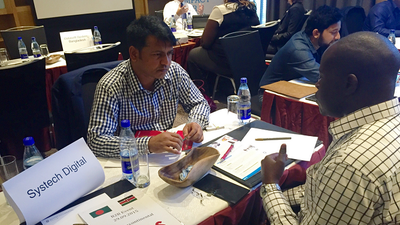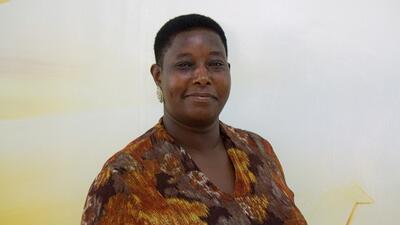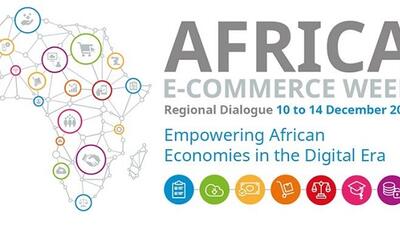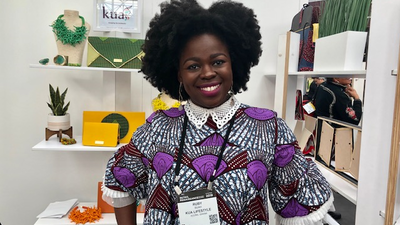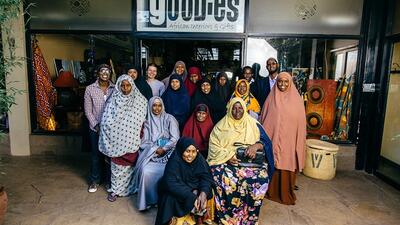


ITC Impact:Kenya (en)
After years of low-paid, unpredictable work in Nairobi garment workshops, a job through ITC’s Ethical Fashion Initiative has helped Jane Nthege upgrade her tailoring skills, move to a better home, and send all five of her children to school.
She now makes US$150 a month, less than her more skilled colleagues earn but more than double her previous wage, working regular hours with paid holidays. She is one of Ethical Fashion Africa Limited’s 1,200 workers in Kenya, spread across 13 groups in Nairobi slums as well as rural areas. ‘It is not only the better pay’, she said. ‘This job has given me back my self-confidence and dignity.’
After moving to Nairobi in 2009 from her hometown of Kangundo, some 70 kilometers east of the capital, Nthege, a 41-year-old single mother, struggled to find steady work. She took on various jobs at informal tailoring workshops in the slum where she was living. The work was irregular: since one workshop lacked a permit, it would close every time city inspectors were rumoured to be in the neighbourhood. Another provided more regular work, but under difficult conditions. ‘We were stuffed for more than eight hours a day in a small working room with little circulation of fresh air,’ she said. ‘My pay was a measly 250 Kenyan shillings (US$2.9) [a day] which could not meet even half of my basic needs. In order to save for my children I used to walk two hours to and from work and skipped meals during the day.’
Her next job, at an apparel company, came with a daily income of KSH 388 (US$4.6), but few benefits. She could only afford to send two of her children to school. ‘My soul was unsettled as I needed to educate all my children and to provide regular meals and decent housing for my family,’ she recalled.
In August 2011, she landed a job with Ethical Fashion Africa, where she swiftly moved up the ladder. ‘I started as a light-duty tailor then through training I received I was allowed to do complicated machine operations using heavy-duty machines,’ she said. ‘This also meant better pay.’ With her KSH 650 (US$7.6) wage, she was able to send all of her children to school, and move to a better house.
New season, new impact
Like much of the clothing and accessories produced through the Ethical Fashion Initiative, which since 2008 has connected artisans from poor and marginalized communities to the top end of the global fashion industry, Jane Nthege’s handiwork will likely travel far from Nairobi.
The Autumn/Winter 2014/2015 season brought a new order of bags and pouches from British fashion designer Stella McCartney. According to an impact assessment carried out during the order, Nteghe and other workers in community groups across Kenya – three-quarters of whom are women – reported increased earnings that enabled them to save and contribute to their dependents’ education.
Skilled personnel involved in supervising, quality control and stitching – accounting for just under half of the workers on the order – saw their salaries rise by 275%. Wage gains for the semi-skilled and manual workers involved with cutting, folding, and packing were proportionately larger, at more than 500%. Fully 61% of the women working on the order reported being able to save part of their income; many said that their incomes brought them independence, dignity, and respect. All workers received training of some kind to meet the order’s high quality standards, and reported greater skills and confidence as a result.
One of ITC’s flagship programmes, the Ethical Fashion Initiative (EFI) is emphatically about work, not charity. It facilitates dignified work at a fair wage by connecting artisans from disadvantaged backgrounds to the international fashion business. In everything it does, the EFI develops local creativity, fosters predominantly female employment and empowerment, and promotes gender equality, with the objectives of reducing extreme poverty and increasing the export capacities of the regions in which it operates.
The EFI’s model has proved replicable well beyond Kenya. In Burkina Faso, hundreds of women weave and dye cotton fabric for international brands including Vivienne Westwoo (UK) and United Arrows (Japan), benefiting from opportunities provided by the EFI such as training in the use of wider looms better suited to industry requirements. In Mali, though work has slowed amidst the country’s recent political unrest, the EFI works with artisan groups in Bamako and Djenné who supply brands such as Stella Jean and Vivienne Westwood with naturally dyed fabrics. In Haiti, a growing chapter of EFI, eight microenterprises are making jewelry from cow horns, recycled telephone wires, and brass, for brands including Brazil’s Osklen and Stella Jean, who showcased their work during the Milan fashion week.
A glimpse of the initiative’s future comes from Ghana, where EFI-backed designers have participated in international fashion weeks, and a manufacturing plant has been set up to produce their creations.




